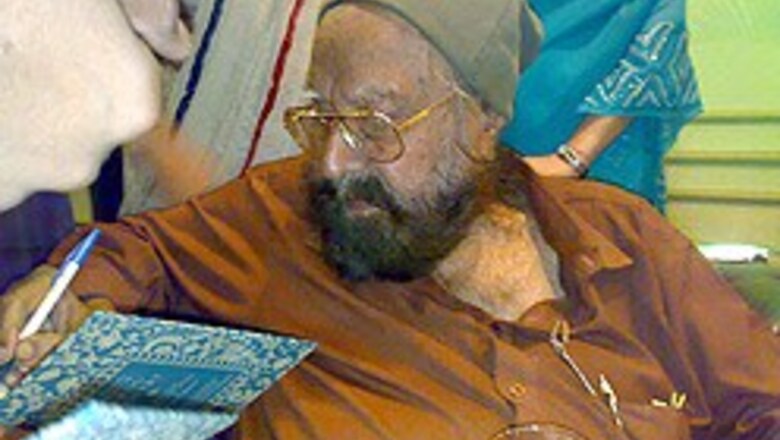
views
New Delhi: Khushwant Singh is 92 but he is not a retired old man. His passion for life and good things is evident when he talks, holds up his whisky glass and tells you that this is the secret of his spirit.
You request him to recite poetry and he answers with a gentle no. Then he changes his mind and obliges you by reciting Ghalib. That’s Khushwant Singh for you. Beyond whiskey, women and humour, poetry is the man’s passion.
At the launch of his book of translation, Celebrating the Best of Urdu Poetry, he spoke to ibnlive.com’s Garima Dutt.
Garima Dutt: How is this translation different from other translations that we have of Urdu poetry?
Khushwant Singh: This is better; that’s all I can say.
Garima Dutt: Do you think translations such as these would help renew interest in Urdu poetry and make it popular among youth?
Khushwant Singh: I hope so and that’s why I have done it. I want the youth to get familiar with this language and the centuries-old tradition it carries with it. I don’t know if the youth are going to sit and read this book in future but I hope they do.
Garima Dutt: These are popular poets. Was there any other reason you selected these poets for your book?
Khushwant Singh: Yes, the fact that these are popular poets was one of the criteria. They are my personal favourites as well. And since these are popular poets, this selection is good for those who want to read a range of great Urdu poets or wish to begin reading Urdu poetry.
(Listen to Khushwant Singh recite Ghalib)
Garima Dutt: What’s the future of Urdu poetry? After Faiz Ahmed Faiz, Urdu has largely found expression in Hindi cinema through poets like Kaifi Azmi, Gulzar, and Javed Akhtar. Now where do you see Urdu poetry in future? Would it just be relegated to book launches?
Khushwant Singh: No, it won’t vanish. Urdu has a great future, the entire film industry relies on Urdu, most of the songs are written in this language and as you pointed out Hindi cinema has been the mainstay of the popularity of Urdu.
PAGE_BREAK
And yes the greats more or less finished with Faiz Ahmed Faiz in the last century and after that we have not produced poets of the same calibre. Though we have had poets like Ahmed Faraz in Pakistan and they are really good.
Garima Dutt: Do you feel that Urdu is modern enough? Or would it vanish like classical languages?
Khushwant Singh: Indeed no, all our modern, well-known revolutionary songs are in Urdu not so much in Hindi. But yes the state of Urdu is very bad, it’s a dying language, the script is dying, (it’s not taught in schools today as it was in our generation) its being absorbed by other languages and enriching it.
So I think Urdu would re-emerge now in Devnagri script or in Gurmukhi script and it is doing so. As I said, I have been reading Ghalib and Urdu poetry for the last few years in Gurmukhi script.
Garima Dutt: What is the reason for this interest in translations, Urdu or otherwise?
Khushwant Singh: Well, I don’t know about other languages so well. I have done a lot of translations myself from Hindi and Gurmukhi but Urdu is my first love and so I try to go for Urdu as my preference when it comes to translations. The basic idea behind bringing out this book of translations is my love for the language and I felt that I should share my love for this language with others. And translations are popular because they provide access to a rich heritage and are read by a lot of people.
Garima Dutt: Who is your favourite poet from this selection?
Khushwant Singh: My favourite poet is Iqbal. I have translated two of his very long poems from original in verse. From Urdu to English: Shikwa and Jawab-i-Shikwa. And believe it or not, in India they have gone to 14 editions. So there is demand for Urdu poetry, I believe.
Garima Dutt: Your family has a long link with Delhi; you have written a lot on Delhi. Do you think writers like William Dalrymple are carrying forward your legacy?
Khushwant Singh: Yes. Dalrymple is a much better writer than I am and I am glad that he is doing it.
(Celebrating the Best of Urdu Poetry. Selected by Khushwant Singh and Kamna Prasad. Translated with an introduction by Khushwant Singh. The book is available for Rs 300/- Publisher: Penguin/Viking.)




















Comments
0 comment